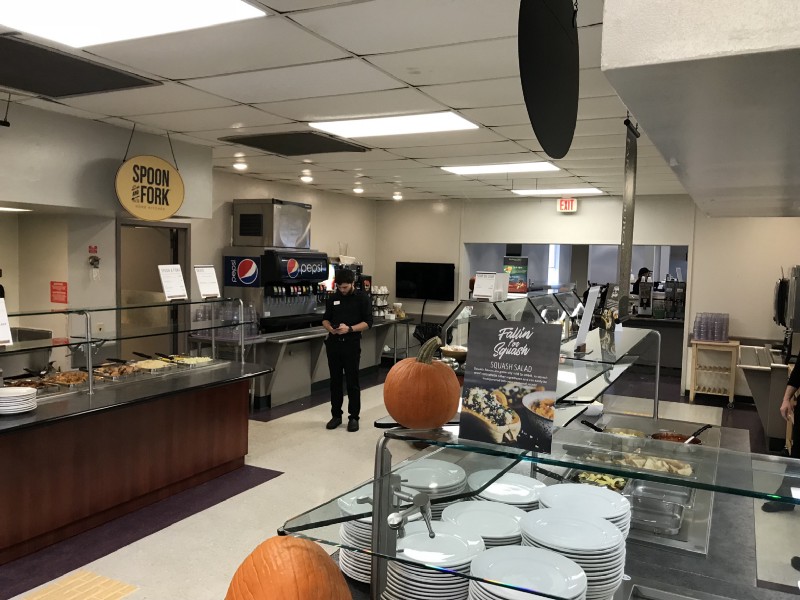By Clair Fink
Chatham University partnered with Parkhurst Dining Services in March 2001 and has been feeding students in Anderson dining hall ever since.
A key part of that operation is sanitation practices. Daily, weekly, monthly and yearly cleaning tasks and checklists are set up to assure that the Anderson dining hall meets health department codes and Parkhurst’s codes of cleanliness, along with its own set of standards.

This is not a “cookie-cutter operation,” said Eric Schlaich, food and beverage safety coordinator. Organizing, planning and prioritizing tasks can be difficult.
One way, though, that personnel is kept up to date on tasks is through daily team meetings, explained Courtney Blood, Chatham’s Parkhust Dining general manager.
“Tuesdays are dedicated to being a little bit longer where we do a little more in depth training, 10 to 15 minutes, just so there are no miscommunications on what needs to be done,” she said.
Dishwashing, of course, is a major part of the food service industry.
“At Chatham we use a chemical sanitizing dishwasher. Here, the safe way to do it for any dirty dishes that we have is to wash, rinse, sanitize and air dry,” Schlaich said. “The health department regulates and monitors them on a routine basis with test strips to make sure everything is at a safe level along with temperature charts.”
Another key factor to keeping things running smoothly and safely is proper presentation and preparation of the food.
“Breaking down into safe food and quality food, our preparation practices are pretty in depth,” Schlaich added. “We really monitor and make sure these steps are being done properly by our staff. In a nutshell, it’s providing that education, monitoring for compliance, then logging that we are doing that the right way.”
Health department codes are a guide for sanitary requirements for dining room employees, as well.
“There are really a whole host of personal hygiene standards that are out there, but we have each team member sign a health awareness agreement. That’s saying if you’re sick, bring it to our attention. That way, we can actively exclude you if necessary,” Schlaich said
Despite these efforts, some students have reported seeing mice in the dining hall.
“Last school year [2017–18], there were some grumblings from a lot of my peers about sightings of the mice species running about in Anderson,” said Marco Nakich ‘21. “I myself have glanced and spotted one for a split second, too.”
To combat mice and other rodents, monitoring is key, Schlaich said.
“Attack problems aggressively before it’s established, whether it’s [a] rodent or insect. It’s much easier to treat at the first sign. That just speaks to good monitoring from the operational standpoint. Preventing it from becoming a bigger issue is important because pests in a kitchen obviously just don’t mix.”
Anderson has weekly visits from pest control, Blood added.
No matter the issue, Parkhurst, Chatham and Anderson staff strive to work together to make sure the health standard bar is being set high and being met.






